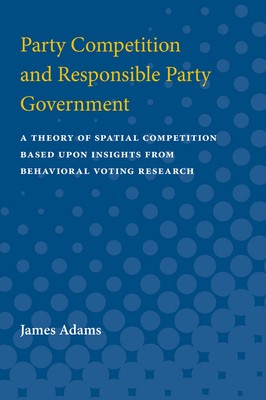
- We will send in 10–14 business days.
- Author: James Frolik Adams
- Publisher: University of Michigan Press
- ISBN-10: 0472087673
- ISBN-13: 9780472087679
- Format: 15.2 x 22.9 x 1.5 cm, minkšti viršeliai
- Language: English
- SAVE -10% with code: EXTRA
Party Competition and Responsible Party Government (e-book) (used book) | bookbook.eu
Reviews
Description
In countries with multiparty political systems, we assume--if the system is going to work--that parties have relatively stable positions on policy, that these positions diverge, and that voters make choices based on policy preferences. Yet much of the research on voter behavior and party competition does not support these assumptions.
In Party Competition, James Adams applies the insights of behavioral research to an examination of the policy strategies that political parties (and candidates) employ in seeking election. He argues that vote-seeking parties are motivated to present policies that appeal to voters, whose bias toward these policies is based in part on reasons that have nothing to do with policy. He demonstrates that this strategic logic has profound implications for party competition and responsible party government.
Adams's innovative fusion of research methodologies presents solutions to issues of policy stability and voter partisanship. His theory's supported by an in-depth analysis of empirical applications to party competition in Britain, France, and the United States in the postwar years.
Party Competition and Responsible Party Government will appeal to readers interested in the study of political parties, voting behavior and elections, as well as to scholars specializing in French, British, and American politics.
James Adams is Assistant Professor of Political Science, University of California, Santa Barbara.
EXTRA 10 % discount with code: EXTRA
The promotion ends in 21d.11:41:14
The discount code is valid when purchasing from 10 €. Discounts do not stack.
- Author: James Frolik Adams
- Publisher: University of Michigan Press
- ISBN-10: 0472087673
- ISBN-13: 9780472087679
- Format: 15.2 x 22.9 x 1.5 cm, minkšti viršeliai
- Language: English English
In countries with multiparty political systems, we assume--if the system is going to work--that parties have relatively stable positions on policy, that these positions diverge, and that voters make choices based on policy preferences. Yet much of the research on voter behavior and party competition does not support these assumptions.
In Party Competition, James Adams applies the insights of behavioral research to an examination of the policy strategies that political parties (and candidates) employ in seeking election. He argues that vote-seeking parties are motivated to present policies that appeal to voters, whose bias toward these policies is based in part on reasons that have nothing to do with policy. He demonstrates that this strategic logic has profound implications for party competition and responsible party government.
Adams's innovative fusion of research methodologies presents solutions to issues of policy stability and voter partisanship. His theory's supported by an in-depth analysis of empirical applications to party competition in Britain, France, and the United States in the postwar years.
Party Competition and Responsible Party Government will appeal to readers interested in the study of political parties, voting behavior and elections, as well as to scholars specializing in French, British, and American politics.
James Adams is Assistant Professor of Political Science, University of California, Santa Barbara.


Reviews